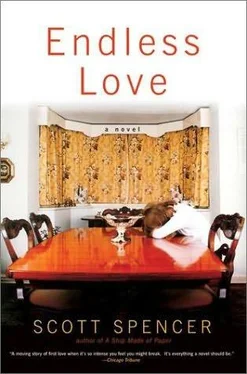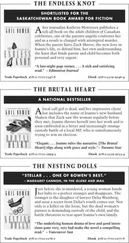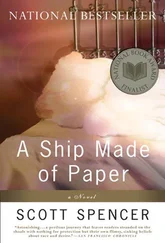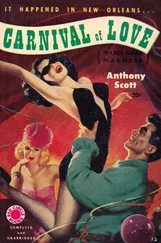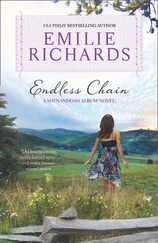“I didn’t want the divorce in the first place. I told him I’d give him one in a minute if he wanted to get married but there was no reason to do it just to live separately. I would like to go to that hospital as his wife and take care of everything. I don’t know if they’ll even listen to me. I might have to get his brother Robert up here from New Orleans. I can’t ask Keith to do it—he wouldn’t be able to. Maybe Jade. I don’t even know where she is right now. Off camping. Lake Champlain. Oh Christ. What I really want to do is go to bed. Or throw myself out of the window. I don’t want to know what this is going to feel like tomorrow.”
I sat there almost immobile, breathing deeply, with my eyes attentive through a film of tears. I wanted only to be solid, to be a wall between Ann and the chaos. All the guilt was mine to feel, every excess of self-loathing and self-pity was available to me. But guilt would be an indulgence in my case, a way of wriggling partially free of the hook of circumstance, the terrifying logic of my life, and, above all, guilt would be a gesture of obsequence to the future, a way of striking a bargain with the day when Ann and everyone else learned that Hugh was racing after me when his life was taken away.
Guilt would have been a swoon of feeling in my own behalf; I owed it to Ann to put all of that away, for now. My guilt, the eruption of my conscience, my inability to understand how I fitted into the fate of the Butterfields, all of that would have been a second assault on Ann. It was time for me to shut up and just be there with her. Nothing I had to confess was as important as Hugh’s death; the truth of the day was inappropriate for the while. That confession would only interfere with the larger fact of Hugh’s death and the grief of the woman who adored him, who joined her body with his and created new lives, who once saw in his eyes the whole of her life. After all the lunges I’d made at the separate universe of feeling, at the uniqueness of perception that stands at the center of endless love, sitting there with Ann and realizing that for the time I was a witness to Ann’s levitation over the plane of normal feelings, I felt the reality—the shifting, unnameable reality—of love, and so as Ann began to sob again and I took her in my arms and held her, I loved her and all of life with the full raging power of my reconsecrated heart.
Sometime later I got up and poured us both a drink. Ann took it in her hand and smiled at me. “You’re a good friend, David. It’s good that you’re here. I wish I could say it was what Hugh would have wanted, but really I can’t think of anyone else in the world who could be in this room right now. None of my new friends. Only you. The children. Sammy. This is a time for Sammy. Oh God, I have to call them. It has to be me.”
“I would do it for you.”
“I know.” She placed her glass on the table, still full.
“And then what?”
“Then the hospital. I should be there. And find out what I have to do.”
“Everyone will help.”
“I hope so.”
“They will.”
“I’d better call them.”
“Do you want me to leave?”
“I don’t really, but I think it would be right. You shouldn’t be here while I’m telling the kids.”
I nodded.
“You better go home, David. You should be on your way back to Chicago. You’ll get in a lot of trouble. You told me so yourself.”
“It doesn’t matter.”
“I know it feels like that right now, but it matters. We all have to look out for ourselves now. That’s how it’s working out. Hugh said the same thing: No more dreams of paradise; every man for himself.”
“It can’t be done.”
“You should go home.”
“I am home.”
“No. Don’t. I know what you’re feeling. And I thank you. But there’s nothing to be done. I’m going to start taking care of everything. I’m practical now. I have the rest of my life to live with what happened but now I’ve got to make arrangements. I have to make telephone calls and be strong for the kids, even if they don’t expect me to. I’m going to do that. You have to go back to Chicago. And I have to make these calls and forget for a while that it was you who was here for me during the worst—” her voice suddenly broke and she lowered her eyes and began to sob. “I’ve got to make these calls,” she said. “And you’ve got to go. That’s all there is to it.”
I wanted to protest. I wanted never to leave her, but I knew it would be wrong for her to make the calls to Keith, Sammy, and Jade with me sitting with her; they would find out and it would add a measure of foolishness and deceit where only sorrow belonged. Without question, they would all learn that I’d been in New York when Hugh was killed, and it was hard to imagine they wouldn’t speculate on the meaning of that. Perhaps by the time they began to solve the unknown in the terrible algebra of circumstance I would have already found the moment to make my own part in Hugh’s death known.
I left Ann’s apartment. I don’t know if she expected me to go back to my hotel or call American Airlines and make a reservation back to Chicago. It didn’t matter. I knew I wasn’t going anywhere. The night was starless and warm. There was a restaurant in the ground floor of her building and customers walked in and out of it. I looked in through the bright open windows; the people inside looked so terribly happy. They sat at tables with little marble-based lamps and painted shades that showed street scenes of old New York: moons over church steeples, buggies drawn by proud high-stepping horses. I felt a sudden surge of desire to be in that restaurant, to be drinking wine and talking with people I knew. I wanted to be in the company of friends such as Charles Dickens imagined, people to whom I could tell my story in all its detail and who would shed tears of pity, neither judging nor forgiving me. But as quickly as the desire appeared, it receded and I turned away from the windows, shaking a little, my head beating like a huge bony heart and the taste of my body’s most appalling recesses rising to the roof of my mouth.
Across the street from Ann’s apartment were the offices of the Children’s Aid Society. The steps to the side entrance faced the entrance to her building and I sat down. The Children’s Aid Society was locked and utterly dark for the weekend, with jail- house bars on the windows. The metal banisters were peeled and rusted, and beneath the steps, going down to a chained cellar entrance, were a number of empty pint bottles showing the labels of cheap vodka and port. The steps themselves were filthy, with chicken bones, spittle, and a kind of general refuse that city life creates the way an engine creates smoke. It was a quiet street and I knew that doorways such as these were used as safe harbors by men who had no homes, but I sat down anyway. I didn’t dare pass the time by walking the streets. I wanted to be right there when Ann left her apartment. The next stop was the hospital and she might need me.
I sat where I could watch the street, west to Park Avenue and east almost to Lexington. I sat for a very long time and the night got cooler, degree by degree, ticking them off like a clock. Maybe it was because I was waiting for some homeless, tormented man to claim my perch for his bedroom, but all I could think of was that man who had placed the dimes on Hugh’s eyes and tried to bring him back to life. He had long fingers and the tips were disproportionately broad. There was a certain disease that did that to you, but I couldn’t think of which one. When he crouched down to administer his magic, the cuffs to his light gray trousers rode up and I saw his bare, scratched ankles. He had no accent; he had traded his racial cadences for psychological ones.
Читать дальше
